Schlagwort: ‘France’
My practical year in Montpellier
- Medicine
- France, Montpellier
- Centre Hospitalier Universitaire (CHU) de Montpellier
- 07/2024 – 10/2024
1. Application/Finding an Internship
From an early stage, it was clear to me that I wanted to complete a substantial part of my practical year, my medical internship, abroad. After planning my first rotation in Dubai and having my second in Germany, I wanted to see and experience something different for my third rotation. I chose to take another challenge: general surgery in Montpellier, Southern France. The application process was relatively straightforward; I sent an email to the head of the department in early 2024, and my application was quickly accepted. Further organization was handled through the universities in France and Germany. The process in France was similar to that in Germany, requiring vaccination records, certain health tests, and proof of insurance. Thanks to EU agreements, I didn’t have to worry about obtaining a visa.
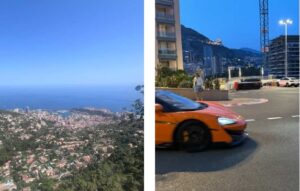
Monaco (left) and the Fairmont Hairpin Curve (right) ©Julia-Laura Schulz
Further planning included my travel arrangements and accommodation. I combined my journey with my family as a little road trip through Switzerland, Italy, and Monaco. For accommodation, I recommend student dormitories, but it is important to note that not all of them accept short-term stays, especially those that span multiple semesters. While I found it easy to secure accommodation for the semester holidays at the start of my internship, I had to move at the beginning of the new semester. Finding new accommodation was quite stressful and not easy, given my work routine and studies. However, in the end, everything worked out.
2. Accommodation & Living Expenses
During my internship, I opted for student housing, which offered a more affordable living option compared to private apartments. The costs for living in Montpellier were manageable, especially considering the financial support I received. I found that groceries were reasonably priced, but dining out could become expensive.
The student dormitories offered essential amenities, such as kitchen facilities, allowing me to cook my own meals, which helped keep my expenses down. While I didn’t strictly budget, I was mindful of my spending since I also wanted to indulge in the local cuisine and travel during my free time. Overall, Montpellier is a vibrant city, and the cost of living was reasonable for a student lifestyle.
3. Everyday Life/The Internship
On the first day of my internship, I registered at the medical faculty next to the hospital, where I enrolled alongside other Erasmus students. I then went directly to the General, Visceral, and Transplant Surgery department, known as “Chirurgie B.” The senior physician responsible for externes showed me around the unit and explained the processes. In France, medical students are referred to as “externes,” while resident doctors are called “internes,” which can be confusing at first, as “interns” in English usually refers to final-year medical students. Our team typically consisted of three German and two French students. The French externes usually rotate every few weeks, which allowed me to meet many different people.
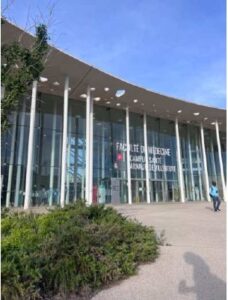
Faculty of Medicine ©Julia-Laura Schulz
Each week, we were assigned to a department, which could include the ward, the operating room, or outpatient clinics. Depending on our interests, we also had the opportunity to rotate through radiology, endoscopy, and anesthesia. Additionally, we had one to two on-call shifts each week (including weekends) for liver transplants. A typical day began with the morning handover from the night shift and a round of visits to all patients on both the general and intensive care wards. After the handover, everyone focused on their own tasks. Once a week, usually on Fridays, there were classes for students, often in the form of OSCE exercises. These sessions were highly educational, although the language barrier sometimes created a tense, exam-like environment. After the classes, the entire team would gather to review and discuss the surgical schedule for the upcoming week, deliberating on various cases. During these discussions, both attending and senior physicians often posed questions to both internes and externes. Additionally, once a month, the internes gave presentations, which were followed by the big weekly rounds.
The general ward was structured similarly to those in Germany, consisting of double and single rooms. The intensive care unit primarily had single rooms, and the operating rooms were comparably designed. Access to various areas of the hospital was secured with access codes. Both internes and externes had a dedicated room on the ward equipped with computers and lockers. All externes received a personal account for the duration of their stay to access computers and the hospital information system.
A particular highlight in Chirurgie B were the liver transplants. During the 24-hour on-call shifts, the ones on-call were responsible for these procedures and had to be prepared to stand in the operating room for about eight hours straight. There was also the opportunity to voluntarily participate in organ retrieval, which often involved traveling to different locations or even flying by private jet. On one occasion, we were escorted by the police, which felt like a movie and was incredibly exciting. The retrieval process is very moving and deeply impressive, as it represents the final and selfless act of brain-dead patients. After retrieval, the liver is transported in a cooled state and appears gray; however, after several hours of surgery and restoration of blood flow, it regains its dark red color. This moment is magical and makes all worries, back pain, and fatigue fade away.
One challenging aspect was the work environment in the department. There was often a tense atmosphere among the resident doctors, which sometimes affected us externes. This led to conflicts between internes and externes, causing misunderstandings with the attending physicians and resulting in stricter oversight. However, thanks to the camaraderie among the externes, this was manageable.
I also wanted to gain insight into neurosurgery, so I contacted the chief physician, who invited me to observe a particularly interesting procedure: an awake brain surgery. The patient underwent head surgery and was awakened for about an hour during the procedure with the assistance of neuropsychologists, who guided her to perform various tasks in order to minimize the risks associated with the surgery. Since I have a strong interest in neurosurgery, this was definitely one of my personal highlights at the clinic.
Despite the initial language barrier and different dialects, I quickly settled in and was able to learn a lot. I observed procedures that I had only previously studied in theory. The awake surgery and the liver transplants were undoubtedly extraordinary experiences that left a lasting impression on me. I would like to extend a special thank you to my colleagues, whose support made the stress of the internship much more bearable. Moreover, the opportunity to forge international connections and broaden my horizons was particularly valuable.
4. Free Time/Tips
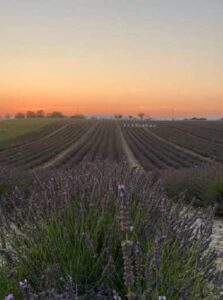
Lavender Fields, Provence ©Julia-Laura Schulz
From the beginning, I met many nice people. After work, we often arranged to meet for dinner, take weekend trips, go canoeing, or even play mini-golf together. A particularly memorable trip was to the lavender fields in Provence, which were breathtakingly beautiful. Watching the Euro football matches together was another unforgettable experience 4 especially the public viewing when France was playing, which created an incredible, lively atmosphere. We also went on trips with the Erasmus group, including horse riding in the Camargue, which was a unique way to explore the region. Numerous wonderful moments were created, and I have many pictures that I enjoy looking at repeatedly.
To pursue my passion for golf, I joined a golf club in Montpellier, where I regularly participated in courses. I met many other golfers, but since this was my last internship rotation, I also had to study for the third state exam, which meant sacrificing some of my free time. During this time, I discovered the university libraries, which I also liked.
The location of Montpellier allowed me to take many trips across Southern Europe. For example, I was able to meet friends in Barcelona or pick up my cousin from her language course in Nice. A particular highlight was our family reunion in Venice for my mother’s birthday, where family members from the USA, the Dominican Republic, and Germany came together. It was wonderful to see the surprised faces of my relatives when they saw us there.
Another delightful moment was when friends from Germany visited me, and we spent a wonderful week together. We explored the city, enjoyed the local cuisine, and shared many unforgettable moments.
On Sundays, I attended mass at various Catholic churches around the city, including the cathedral. Following the mass in French wasn9t always easy, but reading the liturgy beforehand in both German and French helped me follow along more easily and gain more from the sermon.

Lourdes ©Julia-Laura Schulz
For my return journey, my family picked me up, and we drove back via Lourdes and Paris. The Rosary procession and the water ritual formed a meaningful and memorable conclusion to my internship.
5. Conclusion
In conclusion, I can confidently say that the last rotation of my internship abroad was a complete success. I learned not only a lot professionally and linguistically but also gained numerous experiences, impressions, and valuable contacts. Montpellier taught me so much, and this experience will stay with me forever. Therefore, I would like to sincerely thank the Erasmus+ internship program for their support, which, along with my family’s assistance, made this stay possible. If you have any further questions, I am happy to help. Thank you!
My Internship in Paris
- Applied Geophysics M. Sc.
- France, Paris/ Clamart
- SLB Ribout Product Center
- 03/2024 – 08/2024
Application & Finding an internship
The Joint MSc Applied Geophysics is a two-year, joint degree masters offered by TU Delft in the Netherlands, ETH Zurich in Switerland and RWTH Aachen in Germany. Being a student in this unique programme, I had the incredible opportunity to spend a semester in each of the three countries to experience their diverse, yet suprisingly resembling cultures. As part of the graduation requirements, we are required to conduct full-time research in the final semester, with a list of topics provided by the three universities to choose from.
Interestingly enough, there are also external opportunities outside of the three aforementioned universities. In collaboration with one of the programme‘s universities, previous students have worked at research institutes in Norway, companies in Canada, and more. For our cohort this year (2024), there is an internship position from SLB (formerly Schlumberger) in Paris, France. However, we have to compete with students from other universities outside of the programme for this position.
To apply for the internship, I was required to submitted my CV, MSc transcript, and a motivation letter by November 2023. Fortunately, after just one round of interview, I was selected among more than four applicants to work at this prestigious oil and gas company starting from March 2024 for half a year! I must admit, I do feel slightly privileged to have received this internship opportunity, partly thanks to my MSc programme. Therefore I highly recommend that you start your search for an internship early—9 to 12 months before the start date should give you enough time for any administrative and visa applications that might follow. All the best!
Accomodation & Living expenses
Just like finding an internship, it’s best to start early when searching for a room or studio in Île-de-France once your internship is confirmed. Besides the influx of tourists, this bustling metropolis is home to numerous universities, making student housing short in supply.
When choosing a place to live, it’s wise to pick a location with night transport (Noctilien), ideally within Zone 3 of the IDFM transport network. Trust me, you don’t want to end up like me—trying to save money by living in a remote area for 575€/mo (17m2) with no late-night buses, only to find yourself increasingly relying on Uber to get home as your local social life takes off and the parties become more frequent…
To start with, Cite Universitaire (not a university, but a student housing cluster) is a great option for finding a room. Located at the edge of the city of Paris, it offers excellent all-day transport links and, best of all, an exciting student life if you’ve chosen to be an extrovert:: https://www.ciup.fr/en/
Another option is Twenty Campus, a private housing company geared towards university students, with SOME and only SOME of their residences conveniently located for all-day access to Paris: https://www.twenty-campus.com/en/map/
Remember to check reviews on Google or other platforms before selecting a residence!
Besides, the French government offers housing assistance to students living in France through the CAF scheme, which you can apply for after your first month of residence. You can learn more about it here: https://www.feelfrancais.com/apply-for-the-caf/
As for transport, you’re in luck! The IDFM network offers a student annual pass called the “ImagineR,” which costs €375 a year and is valid throughout Île-de-France, covering Zones 1 to 5 all year round. You’ll need your RWTH enrollment certificate and your internship certificate to apply. Learn more about the scheme and save a LOT of money here: https://www.iledefrance-mobilites.fr/imagine-r
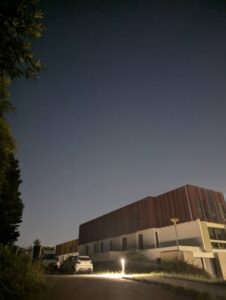
My place is tranquil, but it’s just horribly far away from everything. ©Tin Long Ryan Ko
(Best of all, since you are working as an intern in France, your company is required to reimburse a portion of your transport ticket cost. This means you might end up paying less than half the price of the pass!)
Other expenses in France are quite comparable to that of Germany. Eating out might cost a bit more (at around €20), but trust me, the quality of French cuisine and their hospitality is absolutely worth the extra penny. And if you’re a young museum enthusiast, there’s even better news—most French museums are free for students from EU universities. If you have some free time off work, don’t miss the chance to enrich your cultural knowledge and catch up with the Frenchies!
Digital payment is very common in France, so you can definitely get by without cash for long – unlike in Germany. Here’s a breakdown of my average monthly expenses in Euros:
- Accommodation 575 €
- Food (and groceries) 250 €
- Insurance 70 €
- Travelling/ Misc. 230 €
…bringing my total to around 1150 € per month for everything. Pas mal !
Everyday life/ the internship
While I can’t share the technical details of my internship, a typical workday generally goes like this if I’m not teleworking: It takes me 45 minutes to get from my residence to the office (thanks to my less-than-ideal location), arriving around 10:30 am. I code for a bit, then enjoy lunchtime with my fellow interns from 12:30 pm to 2:00 pm. After that, there’s more coding and occasionally some meetings in the afternoon. I usually leave the office by 5:30 pm at the latest. Although I work 35 hours a week, I’m allowed to telework about two days a week on average. So, the work is pretty flexible, as my supervisor put it: “Just finish the work on time, and you’ll be fine. Don’t let me know where you work.”

Looks chill, but definitely not inside. ©Tin Long Ryan Ko
Are the French chill at work? I guess it depends on the workplace. Since SLB is a global company, some colleagues do end up having to be available at 3:00 am for meetings with American and East Asian headquarters. While my colleagues aren’t too surprised to receive Teams messages outside of official work hours, I have to admit, this did shatter my fantasy of the laid-back French workplace… Hierarchies were flat, though, so there is nothing to worry in this regard.
Don’t take my everyday life in Île-de-France as a reference, though, since the city was in full swing preparing for the 2024 Olympic Games (Jeux Olympiques) while I was enjoying the higher-than-normal living standards in the metropolitan area. Transport was smooth, stations didn’t smell like human excrement, and everyone was surprisingly willing to (try to) speak English rather than French. There was abundant security and police patrolling the streets… All my friends who have lived in Paris for a long time say this was just a dream, and I’ll definitely experience the renowned Paris syndrome the next time I visit.
Anyway, whenever the weather is nice, I like to head into the city, stroll around, visit some museums, take pictures for memories, and indulge in some of the best pastries in the world. I also meet up (or party) with my friends every week or two, eventually causing myself to order an Uber more and more, though it’s definitely worth it.
And if you want to add a touch of romance to your time in Paris, play some songs by Laufey, or any bossa nova in your earphones – it’s an absolute sensation.

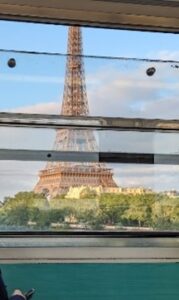
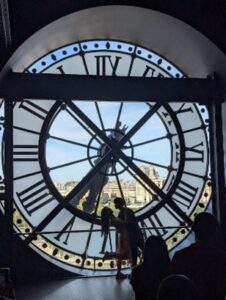
Come on, at least travel to these three places if you are in Paris. ©Tin Long Ryan Ko
Free time/ tips
“If you are lucky enough to have lived in Paris as a young man, then wherever you go for the rest of your life, it stays with you, for Paris is a moveable feast.” ― Ernest Hemingway, A Moveable Feast
C’est vrai.
But what did Hemingway mean by ‚movable feast‘, though? I suppose it differs from one to another person. It can be your romantic life, a galore of museums, endless pub crawls, or just simply the scrumptious food that Paris has to offer. I can’t personalize any solid advice to you reading this now, but do make the most of your time in Paris. Don‘t just stay at home working – that you have done plenty already in Aachen.
I hope the tips and links I’ve written above are practical and helpful. If not, here are some additional general tips that I‘ve brainstormed:
- Moving from A to B within Paris (zone 1 – 2) usually takes 30 minutes, while travelling to/from outside Paris can take about an hour. (Again, try to find a place to live within zone 3!)
- Purchasing pastries from supermarkets, especially baguettes, is a crime.
- There’s no such thing as bad weather, just bad clothing.
- Tap water is LEGALLY free in Parisian restaurants.
- Always be a bit more cautious of your valuables.
- Generally, districts south of the Seine and to the (south-)west of the city are safer.
- Learn some French from Duolingo or any similar apps before you arrive. Definitely useful when you take an Uber or venturing outside of Paris…
- Use both IDFM app AND Citymapper to traverse around the metropolitan.
And as a final tip: travel more! You can earn your expenses back when you start working, but you might well only be in Paris/ France once in your lifetime. France has so much to offer – from the snowy Alpine resorts to the relaxing French riverera, from the historic Normadie to the unique Basque country, you’ll need to visit France 1000 times to truly grasp what the hexagon is all about. The same goes for Paris, that she is both modern and historical, elegant and filthy, refreshing and gothic.
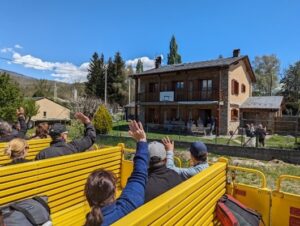
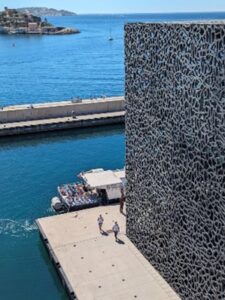
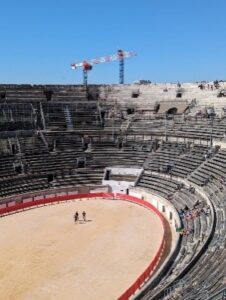
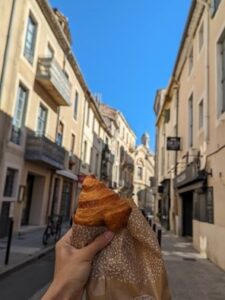
©Tin Long Ryan Ko
Conclusion
Do I have Paris syndrome?
Perhaps I caught the opposite syndrome – I didn’t think I’d enjoy Paris, only to find her seductive allure lingering in my mind now that I’m writing this.
Paris is a horrible place. It’s dangerous, it‘s dirty, everyone is rude as hell and don’t speak English, everything is expensive, and it’s not romantic at all.
With that, you are all set to explore the city. Enjoy 🙂

Paris 2024 opening ceremony. It’s not what you know, but who 😉 ©Tin Long Ryan Ko
Getting to know a different culture
- Mechanical Engineering B.Sc.
- France, Signy L’Abbaye
- Beuret Sarl
- 09/22 – 12/22
My internship in France
The company I worked for produces agricultural equipment and steel structures for buildings. Since the company moved to a new location recently, they needed new custom equipment like tool cart for storing and moving heavy tools. I spent the majority of my time developing, designing in the office and manufacturing this equipment in the factory. Having the responsibility for those projects and completing them was a truly rewarding experience.
Even though I did not work on the division of the company that was responsible for the buildings they let me go on the respective construction sites a few times during my stay. Although this was not at all part of my internship, I still enjoyed discovering the big machines and assembly techniques they used to join the massive components that were previously prepared in the factory.
Working in a small company (about 10 persons in total) helped me to get to know all the people very quickly. I had a great relationship with both the employees and the supervisors from the beginning on which made my time in the company really enjoyable.
I worked a total of 40 hours a week which is not necessarily typical in France. Many people only work 35 hours. This makes room for other activities after work. Also, the meals have a much greater importance than in other European countries. Lots of companies have 60 to 90-minute lunch breaks and it is common for grocery stores and other shops to close during midday. But many stores make up for this by opening their doors on Sunday morning.
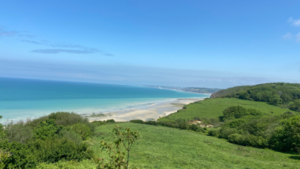
© Dimitri Robert
Luckily, on Fridays I only worked till 12 pm which made it possible to plan longer activities for the weekend. I tried to discover as much as possible of the “Champagne” region. It’s especially known for its production of champagne and its vineyards.
On another occasion I had the opportunity to travel to the beaches of the Normandy and admire the breath-taking landscape. These places are not only beautiful but also have an undeniably interesting historic relevance.
Travelling to these different destinations by train is difficult and takes a lot of time. In addition, the company I worked for was situated in a very rural area. So, having a car was a necessity in this region of the country.
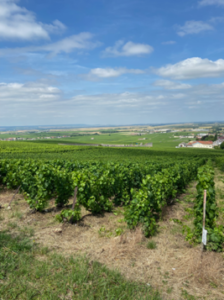
© Dimitri Robert
Something you need to get used to when you live in France are long and late dinners. Most of the time, they start with the well-known “apéro” where you have a few drinks and snacks before beginning to eat your meal. I really enjoyed those convivial evenings. I also observed that drinking wine at dinner was a lot more common than in Germany. Even a lot of young people enjoy drinking a glass of wine instead of beer. In general, the locals are proud of their local wine and especially champagne.
Helpful information
Good news is my phone worked without any issue thanks to EU-Roaming. On the other hand, German mobile network operators have put in place a limit of months that you can spend abroad. Exceeding this time limit will result in them charging you extra roaming fees. Luckily, many French carriers provide very generous offers for the first year of contract. Combined with a pricing that is generally much lower than in Germany, getting a mobile plan with a lot or even unlimited data becomes very affordable. Your mobile plan can even replace Wi-Fi. So, if you plan on staying more than a few months in France, I would definitely recommend getting a French mobile plan.
Same thing goes for your bank account and credit card. You should check with your bank if the card you plan on using works abroad. Opening a bank account was not necessary for me but it made withdrawing money free of charge and receiving my salary was also easier this way.
Keeping in mind that finding a fitting internship and going through the application process would take a bit longer than in my home country, I started to plan my stay more than 6 months ahead. This gave me enough time to prepare everything properly and I would recommend this to anyone who wants to go abroad. All in all, my internship abroad was a great experience for me. Getting to know a different culture and improving my language skills while completing a mandatory part of my curriculum was amazing and I would recommend it to anyone who has the opportunity to do so.
My practical year in France
- Staatsexamen, Medizin
- Rouen, France
- Hôpital Charles-Nicolle de Rouen
- May 2022 – September 2022
Preparation
The preparation began about a year before I started my Practical year (Praktisches Jahr- PJ). For the registration and application, I contacted Ms. Watteel directly, who is responsible for Erasmus stays at Université de Rouen Normandie. She was my contact person during the entire Erasmus stay and took care of all formal requirements and certificates in a timely manner.
Housing
Accommodation can be found at leboncoin.fr (something like Ebay in Germany) or Facebook. There is also the possibility to apply for student residences, but I did not do this. Furthermore, there are many real estate companies in Rouen that rent both furnished and unfurnished apartments. It should be noted that if the apartment is rented through a company, a fee of approximately one month’s rent must be paid. For students, the right side of the city is warmly recommended, because most of the activities and parties are on this side of the city. There are good bus connections to other parts of the city, but they are very limited at night. The university hospital is located almost in the city center and is easily accessible by public transportation.
Job and everyday life
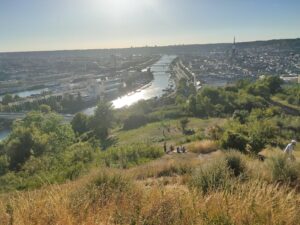
© Lara Gubeljak
I completed a PJ tertial in the clinic for general surgery (chirurgie digestive). There I was in the OR every day and was allowed to assist most of the time, be it directly on the patient or administering the instruments. There were many opportunities for me to actively participate. I found it very good that I was allowed to sew up, that I could participate in organ donations, and that I was also able to perform some tasks beyond the student tasks. A normal day started at 7:30 a.m. and ended between 4:00 p.m. and 6:30 p.m. The visceral surgery team was very nice and had a lot of patience, especially when I occasionally didn’t understand things because of the language barrier. There were some doctors who also explained things in English, although this is not the rule in France.
For the internship, you get a reimbursement of about 250€ per month, but you must check with the HR department often and have a French bank account. All students who are currently doing their internship in a surgical department share the 24 hour duties among themselves. These services are additionally paid but are not obligatory for exchange students. During the night duty you have to do instrumentation and assist in the OR. You get your own room with your own DECT phone. If you are lucky and there are no emergencies, you may (and should!) sleep.
Leisure
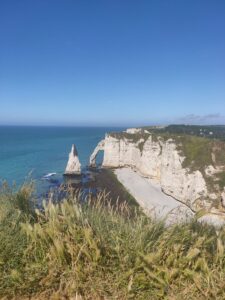
© Lara Gubeljak
I was very fortunate to have a large circle of friends in Rouen, which made the stay overall very social and gave a different perspective to the busy PJ. It is very common to end the evening in a bar or café, although it must be said that due to the early working hours this was often not possible. Rouen is a student city and there is always something going on. In summer there are concerts every Thursday, there is the daily Cathederal de Lumiere, which was exciting every time again. It is a beautiful city from the Middle Ages, so there is a lot of history to see. The numerous museums are free until the age of 26. The surrounding cities like Paris, Le Havre, Étretat or Vernon are very worth seeing and easy to reach by train.
Conclusion
Rouen should and can definitely be recommended for tourism as well as for the PJ. I learned a lot there, was able to do a lot of practical work and strengthened many social skills in the professional setting. The beginning of the PJ was very exhausting, because a lot of things happened very quickly in the hospital and the medical terminology is clearly different, plus it contains many abbreviations. It was a great opportunity to deepen my French and to get an insight into general surgery. Four months were enough to settle in well and to get a little insight into the rest of Normandy.

